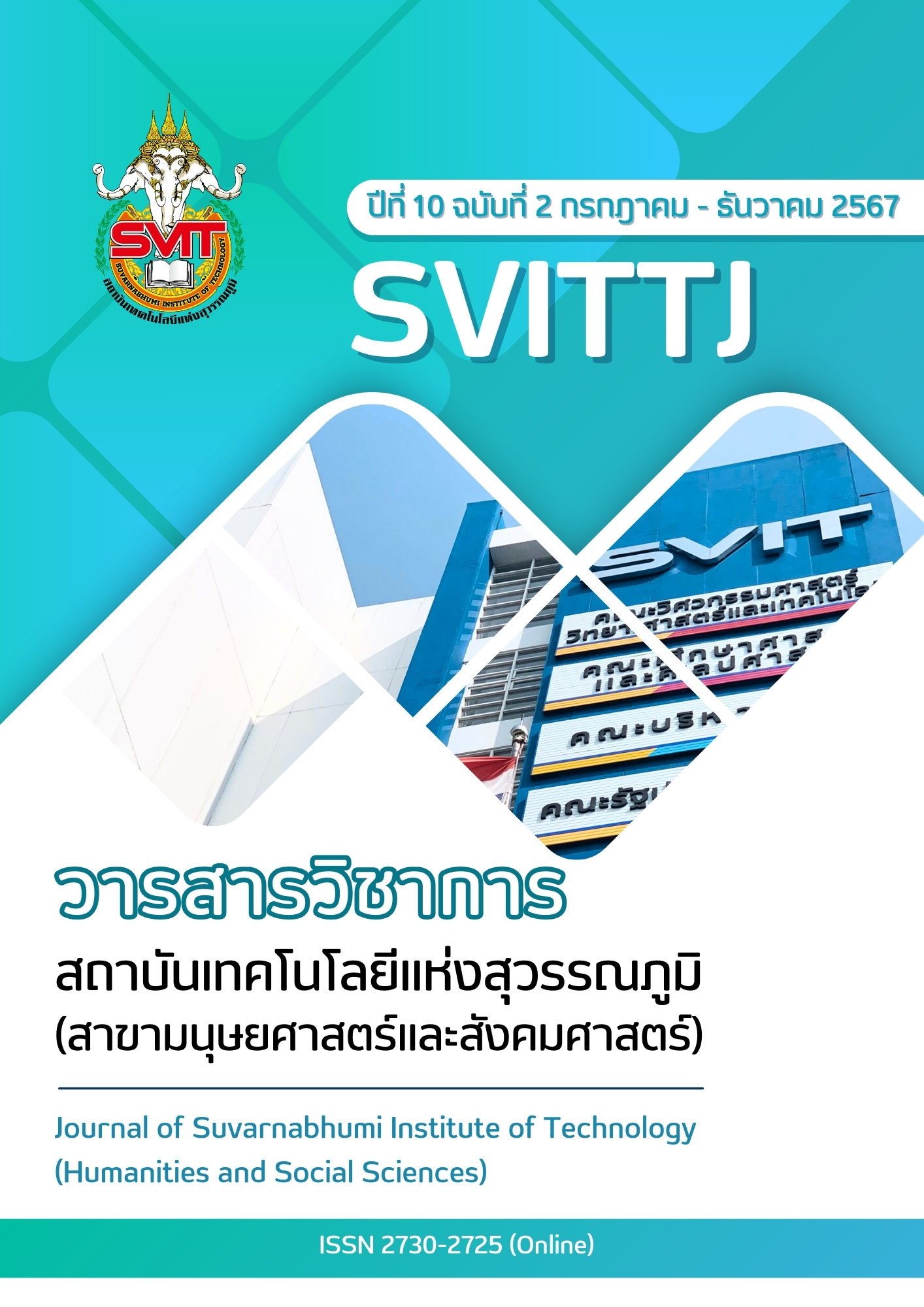AN EVALUATION OF THE DOCTOR OF PHILOSOPHY IN HUMAN RESOURCE DEVELOPMENT (REVISED A.D. 2018), FACULTY OF EDUCATION, BURAPHA UNIVERSITY
-
Keywords:
Curriculum Evaluation, CurriDoctor of Philosophy, Human Resource DevelopmentAbstract
The purposes of this research are 1) To evaluate the curriculum of the Doctor of Philosophy Program in Human Resource Development (Revised Curriculum, B. E. 2561), Faculty of Education, Burapha University, and 2) To provide guidelines for developing and improving the Doctor of Philosophy Program in Human Resource Development, Faculty of Education, Burapha University. The researcher followed CIPPIESST model for this study. Quantitative research approach is used. The population is this study is the stakeholders includes 5 lecturers, 4 current students, 17 Ph.D. graduates, and 7 Ph.D. supervisors, totalling 33 people. Data collection was conducted using questionnaires. Statistics used in data analysis include frequency, percentage, mean, and content analysis. The research results found that Context Evaluation: C, Input Evaluation: I, Process Evaluation: P, Product Evaluation: P, Impact Evaluation: I, Effectiveness Evaluation: E, Sustainable Evaluation: P, and Transportability Evaluation: T were at the highest level in all aspects. And guidelines for developing and improving the Doctor of Philosophy Program in Human Resource Development, Faculty of Education, Burapha University found that it must be a human resource developer with expertise in the field of human resource development, ability to conduct research, be creative, create new things or innovations in human resource development, perform assigned tasks well, discipline and responsibility, teamwork, apply knowledge to solve human resource development problems, creative ideas in designing tools, activities, or innovations in human resource development, develop various processes to achieve efficiency in work, with the characteristics of a human resource developer, conduct and behave according to the professional ethics of human resource developers, logical thinking, leadership, be a role model for change, life skills, digital skills, and lifelong learning.
References
จันทนา อุดม หะริน สัจเดย์ นงนุช ไพบูลย์รัตนานนท์ และณัฐปภัสษ์ จุ้ยเจริญ. (2563). การพัฒนาทรัพยากรมนุษย์เชิงกลยุทธ์. วารสารธุรกิจปริทัศน์, 12(1), 187-196.
จำเนียร จวงตระกูล. (2561). การพัฒนาทรัพยากรมนุษย์เพื่อนาประเทศไทยสู่ประเทศไทย 4.0. วารสารบริหารธุรกิจและสังคมศาสตร์ มหาวิทยาลัยรามคำแหง, 1(1), 1-19.
ธนายุ ภู่วิทยาธร. (2562). การพัฒนาสมรรถนะนักทรัพยากรมนุษย์ในอําเภอเกาะสมุย จังหวัดสุราษฏร์ธานี. วารสารปาริชาต, 32(1), 133-150.
ธัชพงศ์ เศรษฐบุตร. (2560). การพัฒนาสมรรถนะนักทรัพยากรมนุษย์ภาคอุตสาหกรรมเพื่อเตรียมความพร้อมสู่ประชาคมอาเซียน. วารสารสมาคมนักวิจัย, 22(2), 176-190.
ปรีดาพร คณทา และดารารัตน์ อินทร์คุ้ม. (2559). ทุนมนุษย์กับการพัฒนาทรัพยากรมนุษย์แนวคิดใหม่. วารสารนวัตกรรมและการจัดการมหาวิทยาลัยราชภัฏสวนสุนันทา, 1(1), 62-70.
ปัทมาวรรณ จินดารักษ์. (2564). การพัฒนารูปแบบความสัมพันธ์ระหว่างบทบาทและสมรรถนะของนักบริหารทรัพยากรมนุษย์ที่ส่งผลต่อประสิทธิผลองค์การ. วารสารบัณฑิตศึกษา มหาวิทยาลัยราชภัฏวไลยอลงกรณ์ ในพระบรมราชูปถัมภ์, 15(1), 125-141.
ปิยฉัตร กลิ่นสุวรรณ, น้ำผึ้ง มีศีล, และนุชนาฎ ยูฮันเงาะ. (2562). การวิจัยการประเมินหลักสูตรดุษฎีบัณฑิต สาขาวิชาการบริหารสวัสดิการสังคม (หลักสูตรใหม่ พ.ศ. 2557). คณะสังคมสงเคราะห์ศาสตร์และสวัสดิการสังคม มหาวิทยาลัยหัวเฉียวเฉลิมพระเกียรติ.
ปิยะธิดา ปัญญา. (2562). การประเมินหลักสูตรปรัชญาดุษฎีบัณฑิต สาขาวิจัยและประเมินผลการศึกษา มหาวิทยาลัยราชภัฏมหาสารคาม. สถาบันวิจัยและพัฒนา มหาวิทยาลัยราชภัฏมหาสารคาม.
เพ็ญนภา กุลนภาดล, ดลดาว วงศ์ธีระธรณ์, ชมพูนุท ศรีจันทน์นิล, และประชา อินัง. (2563). การวิจัยประเมินหลักสูตรปรัชญาดุษฎีบัณฑิต สาขาวิชาจิตวิทยาการปรึกษา คณะศึกษาศาสตร์มหาวิทยาลัยบูรพา. วารสารวิจัยทางการศึกษา, 15(2), 133-143.
สำนักงานสภาพัฒนาการเศรษฐกิจและสังคมแห่งชาติ. (2561). ยุทธศาสตร์ชาติ พ.ศ. 2561 – 2580 (ฉบับย่อ). เข้าถึงได้จาก https://www.nesdc.go.th/download/document/SAC/NS_SumPlanOct2018.pdf
สุรศักดิ์ ชะมารัมย์. (2562). การเสริมสร้างความเข้มแข็งขององค์การสู่การเป็นองค์การแห่งการเรียนรู้โดยใช้กระบวนการพัฒนาทรัพยากรมนุษย์ในศตวรรษที่ 21. วารสารวิชาการและวิจัย มทร.พระนคร สาขามนุษยศาสตร์และสังคมศาสตร์, 4(1), 116-131.
Stufflebeam, D. L. (1971). The relevance of the CIPP evaluation model for educational accountability. Journal of Research and Development in Education, 5, 19-25.
Stufflebeam, D., & Shinkfield, A. J. (2007). Evaluation theory, models and applications. John Wiley and Sons, Inc.
Rovinelli, R. J., & Hambleton, R. K. (1997). On the use of content specialists in the assessment of criterion-referenced test item validity. Dutch Journal of Educational Research, 2, 49-60.
Downloads
Published
Issue
Section
License
Copyright (c) 2024 Suvarnabhumi Institute of Technology

This work is licensed under a Creative Commons Attribution-NonCommercial-NoDerivatives 4.0 International License.
บทความที่ได้รับการตีพิมพ์เป็นลิขสิทธิ์ของวารสาร Sarasas Journal of Humanities and Social Science ข้อความที่ปรากฏในบทความแต่ละเรื่องในวารสารวิชาการเล่มนี้เป็นความคิดเห็นส่วนตัวของผู้เขียนแต่ละท่านไม่เกี่ยวข้องกับสถาบันสารสาสน์เทคโนโลยีแห่งสุวรรณภูมิแต่อย่างใด ความรับผิดชอบองค์ประกอบทั้งหมดของบทความแต่ละเรื่องเป็นของผู้เขียนแต่ละท่าน หากมีความผิดพลาดใดๆ ผู้เขียนแต่ละท่านจะรับผิดชอบบทความของตนเองแต่ผู้เดียว



